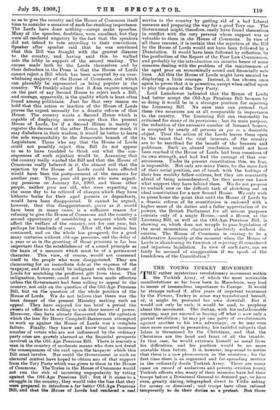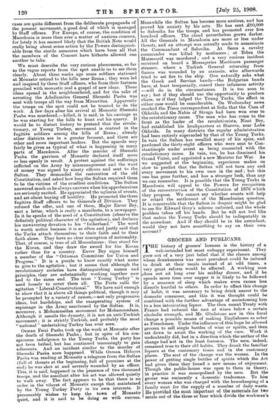THE YOUNG TURKEY MOVEMENT.
.THE rather mysterious revolutionary movement within the Turkish Army, of which the most noticeable manifestations so far have been in Macedonia, may lead to issues of tremendous importance to Europe. It would be strange indeed if; after years of impotent treatment by the Powers; Turkey in some way trausfortned herself, or, it might be, procured her own downfall. But it would not only be rash, it would be mad, to prophesy about the trievetuent. The Sultan, with his unfathomable' cunning, may yet succeed in buying off what is now only a partial retoletion ; he may pit one party of revolutionists against another to his own advantage ; or he may even. once more succeed in persuading his faithful subjects that Islam is threatened by the Christians, and that the Christians are the head and front of all the trouble. In that case, he would extricate himself as usual from his difficulties, and his position would be no more unstable than before. It iS, however, important to notice that there is a new phenomenon in the situation ; for the first time there is an organised and far-spreading mutiny in the ordinarily docile Turkish Army. There are many cases on record of audacious and poverty-stricken young Turkish officers who; weary of their miseries, have led their troops before a Divisional General to demand pay, or have (lien; greatly daring, telegraphed direct to Yildiz asking for money or dismissal; and. troops have often refused temporarily to do their duties as a pretest. But those cases are quite different from the deliberate propaganda of the present movement, a good deal of which is managed by Staff officers. For Europe, of course, the condition of Macedonia is more than ever a matter of anxious concern, for lately it has seemed likely that the British Note would really bring about some action by the Powers distinguish- able from the sterile measures which have been all that the members of the Concert have hitherto allowed one another to take.
We must describe the very curious phenomena, so far as the vague reports from the spot enable us to see them clearly. About three weeks ago some soldiers stationed at Monastir retired to the hills near Resna ; they were led and inspired by three Staff officers, who from their fastness preached with monastic zeal a gospel of new ideas. These ideas spread in the neighbourhood, and for the sake of arresting the Adullamites General Shemshi Pasha was sent with troops all the way from Mitrovitza. Apparently the troops on the spot could not be trusted to do the work. A few days after his arrival at Monastir Shemshi Pasha was murdered,—killed, it is said, in his carriage as be was starting for the hills to hunt out his quarry. It would be to distort history to pretend that the revolu- tionary, or Young Turkey, movement is centred in the fugitive soldiers among the hills of Resna ; already other districts are in a greater ferment, and there are other and more important leaders. But the episode may fairly be given as typical of what is happening in many parts of Macedonia. After the murder of Shemshi Pasha the garrison of Monastir declared itself more or less openly in revolt. A protest against the sufferings inflicted on the Army by mismanagement and the want of money was signed by ninety officers and sent to the Sultan. They demanded the restoration of the old Constitution, and asked how long the Sultan required them to be the victims of the cruellest conditions. The Sultan answered much as he always answers when his apprehensions are seriously excited. He appreciated the ugliness of events, and set about buying off hostility. He promoted the three fugitive Staff officers to be Generals of Division. They refused the offer, and one of them, Major Enver Bey, sent a letter, which is really a manifesto, to a newspaper. In it he speaks of the need of a Constitution (observe the definitely political character of the agitation), and declares his unwavering devotion to his "fatherland." The word is worth notice because it is so often and justly said that the Turks attach themselves to their faith and to their faith alone. They have no clear conception of nationality. That, of course, is true of all Mussulmans ; they stand for the Koran, and they draw the sword for the Koran rather than for a country. Enver Bey signs himself a member of the "Ottoman Committee for Union and Progress." It is a puzzle to know exactly what name to give to the agitation ; but it seems that although the revolutionary societies have distinguishing names and principles, they are substantially working together now and to the same end. The term "Young Turkey" is used loosely to cover them all. The Porte calls the agitation "Liberal-Constitutional." We have said enough to show that it is above all things political, though it may be prompted by a variety of causes,—not only progressive ideas, but hardships, and the exasperating system of espionage in the Army sanctioned by the Sultan. It is, moreover, a Mohammedan movement for Mohammedans. Although it assails the dynasty, it is not an anti-Turkish movement ; it is strictly Turkish, and probably the most "national" undertaking Turkey has ever seen.
Osman Feizi Pasha took up the work at Monastir after the death of Shemshi Pasha ; but in spite of his con- spicuous indulgence to the Young Turks, the party has not been bribed, but has continued unceasingly to gain adherents. And an incident similar to the murder of Shemshi Pasha soon happened. While Osman Hidayet Pasha was reading at Monastir a telegram from the Sultan (full of threats at the beginning, full of promises at the end) he was shot at and severely wounded by an officer. This, it is said, happened in the presence of two thousand troops, and the assailant after his act was allowed quietly to walk away. The fact appears to be that there is no order in the vilayet of Monastir except that maintained by the Young Turkey Party in its own interests. It presumably wishes to keep the town of Monastir quiet, and it is said to be doing so with success. Meanwhile the Sultan. has become more anxious, and has proved his anxiety by his acts. He has sent .280,000 to Salonika for the troops, and has promoted over five hundred officers. The cloud nevertheless grows darker. All the Generals in Macedonia are more or less under threats, and an attempt was actually made to assassinate the Commandant of Salonika. At Sores a cavalry. commander was killed by mutineers ; at Bibra the Mutessarif was murdered ; and a very curious incident occurred on board a Messageries Maritimes passenger steamer, where a Turkish General returning from Samos was wounded by an assassin, who afterwards tried to set fire to the ship. One naturally asks what the Greek and Servian bands—the Bulgarian bands have, at least temporarily, ceased their infamous activity —will do in the circumstances. It is too soon to say ; but if they should use the opportunity to produce chaos, or if they helped the Young Turks, the effect in either case would be considerable. On Wednesday news reached the Times correspondent at Sofia that the Caza of Okhrida and the Nahie of Struga, had been won over to the revolutionary cause. The man who has come to the front as the leader of the revolutionists, Niazi Bey, had established his headquarters at Statova, near Lake Okhrida. In many districts the regular administration had been entirely superseded by that of the Young Turks. In vain the Sultan has recalled many of his spies, and pardoned the thirty-eight officers who were sent to Con- stantinople under arrest as being connected with the revolutionary cause. In vain, too, he has dismissed his Grand Vizier, and appointed a new Minister for War. As we suggested at the beginning, experience makes Mt slow to predict that the Sultan will not turn any and every movement to his own uses in the end ; but this one has gone further, and has a stranger look, than any we can remember. It is possible that the Young Turks in Macedonia will appeal to the Powers for recognition of the reconstruction of the Constitution of 1876 which they propose. We cannot say whether events will help or retard the settlement of the Vacedonian question. It is conceivable that the Sultan in despair might be glad to see Sir Edward 'Grey's scheme enforced, and the whole problem taken off his hands. But he will not feel like that unless the Young Turks should be indisputably in the ascendant. And if they should be in the ascendant, would they not have something to say on their oWn. account?







































 Previous page
Previous page